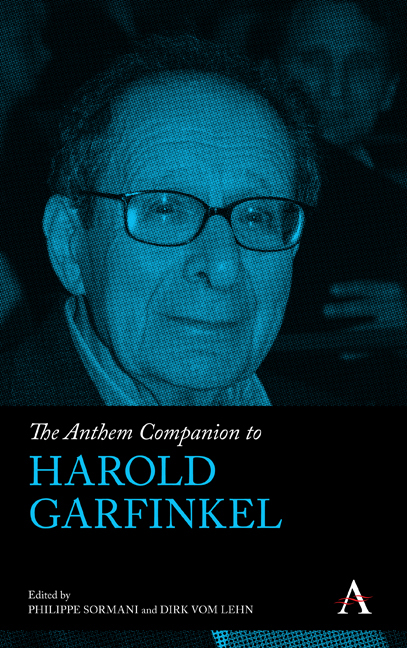Book contents
- Frontmatter
- Contents
- List of Illustrations
- Introduction: Rediscovering Garfinkel's “Experiments,” Renewing Ethnomethodological Inquiry
- Part I Exegesis
- Part II ‘Experiments’
- Part III Implications
- Postface: “Experiments”—What are we Talking About? A Plea for Conceptual Investigations
- Notes on Contributors
- Index of Names
- Index of Subjects
Chapter Six - Disruptures of Normal Appearances in Public Space: The Covid-19 Pandemic as a Natural Breaching Situation
Published online by Cambridge University Press: 28 February 2024
- Frontmatter
- Contents
- List of Illustrations
- Introduction: Rediscovering Garfinkel's “Experiments,” Renewing Ethnomethodological Inquiry
- Part I Exegesis
- Part II ‘Experiments’
- Part III Implications
- Postface: “Experiments”—What are we Talking About? A Plea for Conceptual Investigations
- Notes on Contributors
- Index of Names
- Index of Subjects
Summary
Introduction
This chapter discusses instances of breaching rules and constitutive expectancies concerning witnessable conduct in public space during the Covid-19 crisis, treating the pandemic as a perspicuous context for reflecting back on Garfinkel's contributions on trust conditions as basis for the public intelligibility of social order and the concept of breaching. We show how the reference to trust conditions and breaching enable us to better understand the changes involved in the pandemic as a progressively established social fact, in particular with regard to the seen but unnoticed features of ordinary conduct in public space. In turn, the way in which social practices in public space were promptly addressed and normatively changed during the pandemic sheds new light on the conceptualization of (naturally occurring) breaching as a members’ problem that is reflexively established in and as social interaction.
In this introduction, we discuss the notion of “trust” in relation to “breaching” as introduced by Garfinkel (2002) (“Trust and breaching” section), and then situate our reflection on breaching in the sociohistorical context of the Covid-19 pandemic in general (“Pandemic and breaching” section) and as concerning public space in particular (“Public space under Covid-19 as a perspicuous setting” section). Next, after having situated the video data this chapter is based on (“Data” section), we propose a study of how the accountability of conducts in public space suddenly became inspectable and altered during significant moments of the pandemic (“Formulating what happened and the understanding of the new rules,” “Overseeing police work enforcing the rules,” “Inspecting distance between people,” “Inspecting the number of people assembled” sections). The conclusion discusses the consequences of these disruptions for how issues of trust and normative order can be revisited (“Conclusion” section).
Trust and breaching
The notion of “breaching” normative orders, as a way to reveal the constitutive expectancies that makeup the seen but unnoticed features that render the social world meaningful, was discussed by Schütz (1962) and elaborated on by Garfinkel (1963, 1967, 2002). Pursuing how to produce “specifically senseless” situations (Garfinkel 1967, 55) stems from an interest in how to account for members’ shared, commonsensical attitude to the experience of everyday life as a situated accomplishment and how to observe it in moments of trouble.
- Type
- Chapter
- Information
- The Anthem Companion to Harold Garfinkel , pp. 97 - 120Publisher: Anthem PressPrint publication year: 2023



